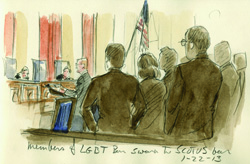LGBT lawyers join high court bar

Supreme Court illustration by Art Lien.
“Remarkable for being unremarkable.” That’s how San Francisco attorney John T. Hendricks describes his induction into the U.S. Supreme Court bar on Jan. 22.
Hendricks was admitted with about 30 other members of the National LGBT Bar Association, marking the first time gay lawyers as a group were admitted to the Supreme Court bar. It is customary for lawyers to be admitted to the high court’s bar with a group, such as a professional organization or alumni of a university or service group.
The ceremony allows attorneys to practice before the Supreme Court, and to be admitted a lawyer must be sponsored by two members of the bar who know the applying lawyer personally and are not related to the applicant by blood or marriage. The applying lawyer must also obtain a certificate of good standing from the presiding judge, clerk or other authorized official of the highest court of a state or territory or the District of Columbia as evidence that the lawyer has been a member of the bar serving that court for at least three years and is in good standing.
Hendricks, a member of the board of directors of the LGBT bar and a delegate to the ABA House of Delegates, says he felt “the same humility of every other lawyer who is admitted to practice before the court.”
Hendricks notes that he is a business law litigator, not a civil rights attorney, and he has been out as gay since law school. Though his sexual orientation “is an integral part of who I am, it does not define me.”
HISTORY IN THE MAKING
The induction of LGBT attorneys comes at a time when major gay rights cases are before the court, including Hollingsworth v. Perry challenging California’s Proposition 8 that prohibits gays from marrying and U.S. v. Windsor, which challenges the federal Defense of Marriage Act.
Proposition 8 is a state voter initiative that amended the California Constitution to limit marriage to a man and a woman. DOMA was passed by Congress and signed into law by President Bill Clinton in 1996. DOMA codified the nonrecognition of same-sex marriage in federal law, including insurance benefits for government employees, Social Security survivors’ benefits and the filing of joint tax returns. DOMA also restricts the federal government from recognizing same-sex marriages performed in states where such unions are legal. Both cases are expected to be decided by the end of the court’s current session in June.
Paul Smith, a Washington, D.C.-based partner at Jenner & Block, has filed amicus briefs in both Hollingsworth and Windsor. Smith presented the appellant’s argument before the court in Lawrence v. Texas, which struck down the Texas sodomy law as a violation of the due process clause of the 14th Amendment.
Smith says “the existence of such laws meant that [gay] attorneys would have had to admit to violating a criminal code” and resulted in gay lawyers being closeted. Thus, he says, the January induction before the court was “a nice moment” to have a group of gay lawyers recognized as other groups are.
D’Arcy Kemnitz, executive director of the Washington, D.C.-based LGBT bar, says the swearing-in ceremony “certainly adds to gay lawyers’ self-esteem” and “makes us feel less like criminals.”
“The significance of a ceremony like this is that we become normalized as officers of the court,” she explains. “Around the office water cooler, we don’t want to be the people who appear to be secretive. We want to be team players.”
As to possible future civil rights cases involving gay rights issues, Smith and Hendricks agree that much may depend on the outcome of the Hollingsworth and Windsor cases.
Hendricks speculates that future litigation could involve issues such as spousal benefits, partner visitation rights in hospitals or employment discrimination matters.
“I practice in the area of employment law,” he adds, “and … sexual orientation or other workplace issues can fall under the umbrella of Hollingsworth and Windsor. So my admission to the Supreme Court is relevant to prospective matters I may be involved in.”



